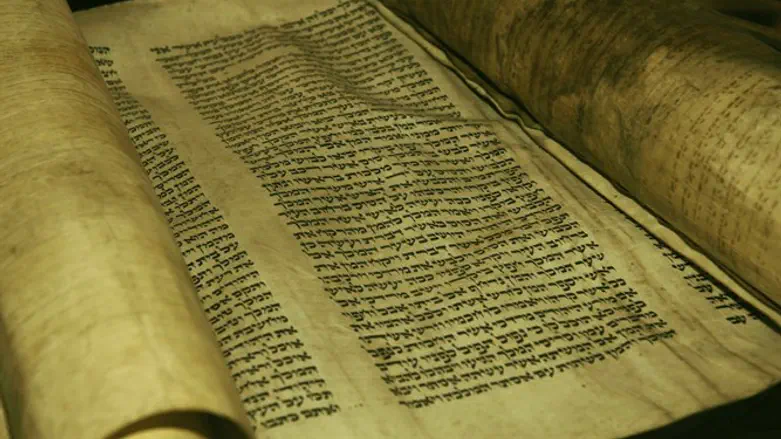

We may observe that each of the Torah's chumashim presents a transition for the Jewish nation:
- In Bereishit we evolve into a clan.
- In Shemot we experience slavery, redemption and revelation en route to becoming G-d-centered, with an ideology and a mission.
- In Vayikra we develop spiritually, learning the mechanics and meanings of sanctity and purity.
- In Bamidbar we again evolve, from the fresh-faced recipients of the Torah at Sinai to an older, perhaps sadder nation on the cusp of entering the Land of Israel.
- In Devarim we lose Moshe, and the nation of masorah [received tradition] takes the place of the nation of direct personal experience.
The above observation runs into a snag, though, in a talmudic reflection (Shabbat 116a) on our parshah. Noting the odd insignia which demarcate the beginning of Bamidbar 10:35 and the end of Bamidbar 10:36 in the Torah, Rabbi Yehudah haNasi contends that Bamidbar 10:35 and 36, constitute a chumash in themselves. [Of course, viewing Bamidbar 10:35-36 as an independent book should render the word chumash, meant to connote one of the Torah's five books, obsolete; there would now be seven chumashim! However, we will continue to use the term chumash in this article, rather than coin a new term.] But if this small section is a chumash, then what transition takes place therein?
The verses themselves do not seem to contain any action, or any lessons for Jewish practice: "And it was, when the Ark travelled, that Moshe said: Arise, G-d, and Your enemies will be scattered, and those who hate You will flee before You. And when it rested, he would say: Settle, G-d, among the myriads of thousands of Israel." How do the Jewish people change in the course of these two verses?
Perhaps an answer lies not in action or halachah, but in the depiction of G-d offered here. Until now, the "bad guys" of the Torah fought with us; as their stories are spelled out in the Torah, the Egyptians and the Amalekites were concerned primarily with the Jews, and with G-d only second, if at all. Here, for the first time in Jewish history, G-d is presented as having enemies, and the Jews are eager for their defeat.
In the early emotional life of a child, a parent lacks any personality or identity beyond that of protector and nurturer. The narrative of a parent's existence, his life before the child was born, her ambitions and social interactions, are of no relevance for the child. At some stage, though, the child becomes aware of the parent's broader identity, and of the role that the child plays on that fuller stage. This, perhaps, is the metamorphosis that takes place in Bamidbar 10:35-36 – we learn of our Parent's existence beyond His actions of feeding, clothing, teaching and protecting us. We learn of G-d's relationship with the broader world.
Much of our Judaism is applicable only once we undergo this metamorphosis, recognizing the importance of spreading awareness of G-d and of our own responsibility to execute that mission. The concepts of kiddush HaShem and its opposite, chillul HaShem, are about more than sanctifying the Divine Name in our own midst (Vayikra 22:32); they are also about how G-d is viewed in the greater world. (Yechezkel 38:23) The imperative, "Cause the Name of G-d to be beloved through your actions," is linked by the Talmud (Yoma 86a) to a verse in Devarim (6:5), after this book, and not in Shemot or Vayikra. And so it is that in Shemot we are told that G-d will personally wipe out the name of Amalek (Shemot 17:14), but in Devarim we are told that it is also our own mission to wipe out the name of Amalek. (Devarim 25:19)
Unfortunately, our transition did not go smoothly; in the very next biblical chapter we displayed conduct as selfish as any in the preceding chapters of our history, complaining of the faintest privation and driving Moshe to desperation. We were not yet ready, and the path to maturity was long and winding, but there were flashes of brilliance along the route, such as Yehoshua and Kalev standing up to slander, Pinchas standing up to immorality, and Devorah standing up to national cowardice.
We are not yet at the end of this path; we have not yet reached the stage at which all of us, all the time, ask, "What can I do to promote G-d now?" This is not a matter of evangelism, but of actions which, by dint of their visible loyalty to Divine command, challenge the foes identified in Bamidbar 10:35.
We would do well to learn the lessons of this chumash, to stop seeing G-d as exclusively personal and instead comprehend the greater picture, a universe in which we are active participants in promoting Truth. When we do, we will also merit the second half of this chumash, Bamidbar 10:36, and G-d will settle among the myriads of thousands of Israel.
